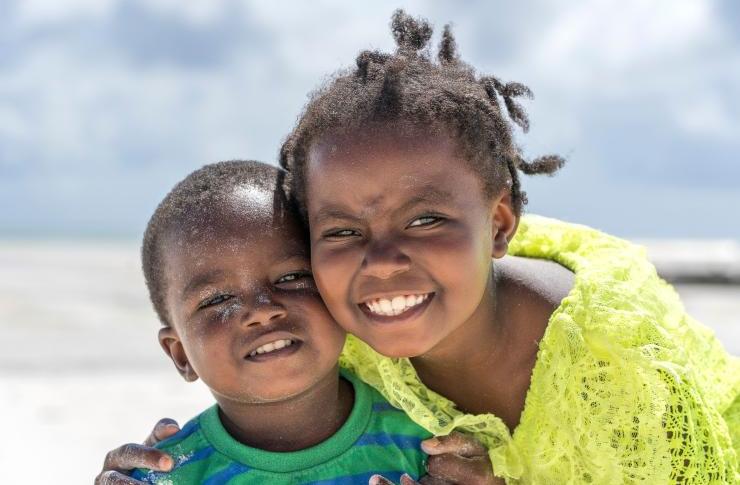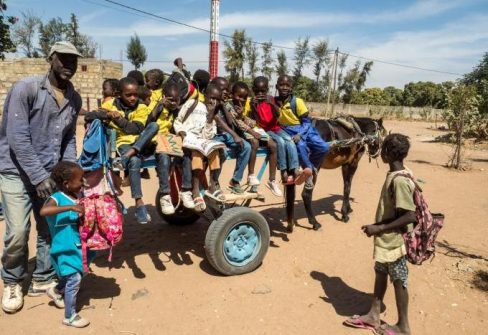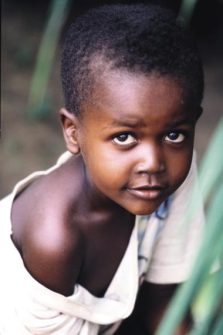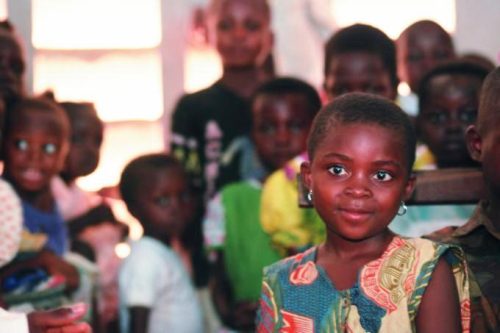The importance of African Names.

In many African cultures, one cannot call directly the name of a person whose rank is higher than one’s own. Father, mother, uncle, aunt, sister and brother… is all you will hear in some families.
Moreover, in Africa, names are not given casually. They are given solemnly in a naming ceremony. There are sometimes cases when given names are rejected. Signs like the abnormal crying of the baby, mysterious diseases are warnings that the naming of the baby has been delayed or that the wrong name has been given to the baby.
Twin babies, babies born face down, babies coming out of the womb legs first, those who are born with the umbilical cord around their waist etc. have special or fixed names in almost all African cultures. In Uganda, there are names that indicate time (Onyango, Owori, Nabwire), season (Okot, Obonyo), human activities (Odoi, Nnamirimu) etc…

Senegal. Transport of African children on the cart from school. In west Africa, names like; Koffi, Kossi, Kodjo, etc.. are all names indicating the day when the child was born. 123rf
In west Africa, names like; Koffi, Kossi, Kodjo, Kwasi, Kwaku etc.. are all names indicating the day when the child was born.
In Uganda, we mainly have Sunday, Friday and Monday, to show that the child is a cosmic entity. The name situates the person who carries it in time and space socialized by the group that gives it. The naming ceremony is therefore a ritual of identification. It is an answer to the following questions: Where does this child come from? Who has sent him/her? Which ancestor has re-incarnated in him/her ontologically or symbolically? The discovery of the right name is the result of efforts
and pre-occupations.
At birth, a baby is examined up to the smallest detail and all his/her resemblances are examined carefully, whether to a deceased adult of the family or to a child of the same mother who died. In this latter case, there is the suspicion that it may be a malignant spirit which transforms itself into babies that die in infancy in order to disturb the family and to deny posterity to the mother in question. This is the reason why still born babies have their legs tied before being buried unceremoniously. The message to the baby is: “don’t come back.” Sometimes, the dreams of the mother, especially about the ancestors are taken into considerations; the family may even seek the services of a diviner if things are not so clear.

In Uganda, there are names that indicate time. File swm
The naming ceremony is also a ritual of orientation. The baby will have to follow his/her model, although this does not mean that he/she will not develop his/ her own personality. The name is both a symbol of openness and a sign of pre-determinism. Telling one’s name is revealing oneself, exposing one’s program of life and showing that freedom can only be exercised
in determinism.
Among the Ugandan Westerners (Banyankole, Bakiga, Banyoro, Batooro), the Banyarwanda and the Barundi, theophoric names i.e., names connected with God. In Western Uganda, names like; Tumuhimbise (we praise God) Tumusiime (we thank God), Tumuramye (we adore God), Twinomuhangi (we are with God) Tumwesigye (we trust God), Mbabazi (God is merciful), Mubangizi (God is our protector) are very common. They show God’s intervention in the family and the confidence of the family in God’s solicitude. They also express a pact between God and his creatures.
The Bakonjo and the Barundi often give names which indicate the position of the child in the line of his siblings. Paluku or Baluku is the first male child in Bakonjo family while Nyabenda is the nineth
in a family of the Barundi.

Uganda. Most of the Baganda have clan names. File swm
Names are delicate in African cultures. The modern policy of calling a mother by the name of her first child, e.g. Maama Joseph, is a way of avoiding her name. The petty names of the Banyoro and Batooro (Akiki, Abwoli etc) may also serve the same purpose.
Most of the Baganda have clan names. Apart from showing to which clan one belongs, the names help to reinforce exogamy: one cannot marry from his or her clan or from the clan of his or her mother. These clan names also reveal one’s connection with the Kabaka (King) since every clan has a special service to the monarch.
One curious thing among the Nilotics is that many of them are “negative” names. Names like Bitho (he will die), Drani (death) Ocan (poor, sufferer), are very rare among the Bantu. The Bantu prefer “positive” names like Ssanyu (Joy), Busingye (Peace), Mbabazi (mercy) etc.
We have here two ways of wading off evil. While the Bantu avoid it by not talking about it, the Nilotics face it squarely and call it by name as a way of keeping it at bay. The modern tendency of changing one’s name at will sometimes leads to absurdity. Girls who give themselves male names or names of their fathers may lead to the confusion as to who is wife or daughter. Whatever was done to find the right name for the person, the circumstances around his/her birth, the importance of the ancestor after whom the person was named— are all lost when the person changes his/her name arbitrarily. (Photo: Young happy girl and boy near sea water on the tropical beach in island of Zanzibar, Tanzania. 123rf)
Edward Kanyike



